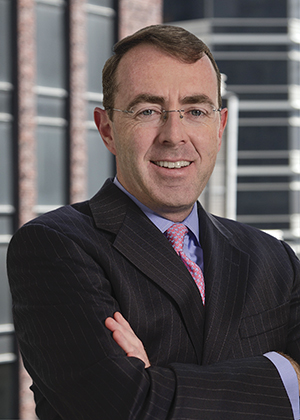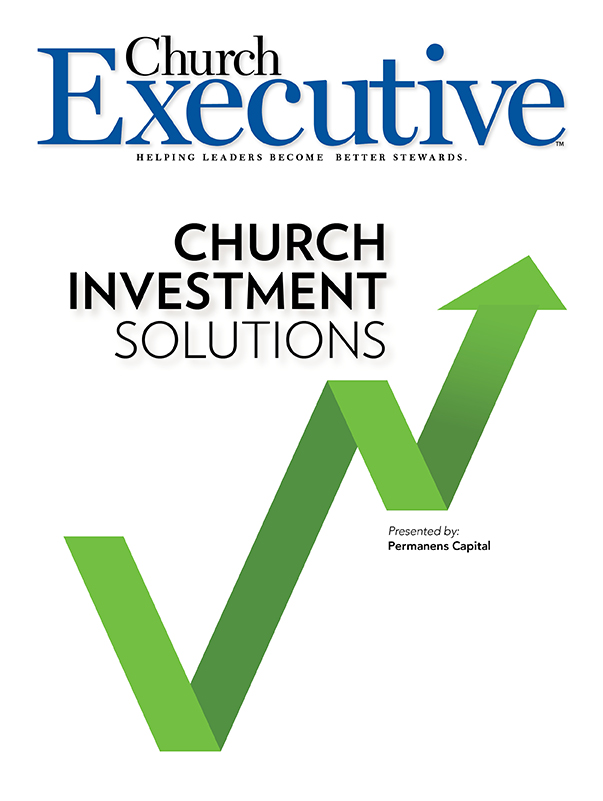The need to manage cash is a good “problem” to have … but what should your church do with it?
John Regan, Founding Partner and Chief Investment Officer at New York-based Permanens Capital, talks about playing it safe, while earning some modest return.

How big of a priority and a problem is cash management in many churches?
Before 2008, cash management was not a difficult task. An investor could easily access short-dated Treasury Bills yielding around 4% via the Fed’s online portal. During the 2008 financial crisis, institutions learned that not even money market funds were entirely safe and many “broke the buck” (declined to less than $1 per dollar invested). Funds that achieved this dubious status have strayed away from safe T-Bills and Agency notes in a grab for an extra .10%-15%. Since 2008, institutions, including churches, have learned that discretion must be used when selecting cash management options or attempting to earn a little yield in a “yield-less” world.
We learned firsthand about the importance of cash management when onboarding our first client, the largest Christian university in the U.S. The university was not seeking to beat the popular and risky Ivy League endowment allocations, but rather earn a bit of yield from a relatively safe portfolio, instead of keeping all their assets in cash or bank CDs. As we were introduced to churches, we learned that this challenge was widespread, as church CFOs or finance staff seek to solve the problem of safeguarding the church’s cash while also earning a modest yield.
At many Christian institutions, we have often seen CFOs separate cash into three different pools:
Operating Cash consists of all the cash flows that circulate in and out of the church in the form of donations and spending. We have always advised that this cash absolutely not be invested, as access and liquidity is paramount.
Building Funds are funds that will be drawn down to a zero balance as a real estate project or building is developed. We have frequently been asked by churches to invest to earn a 2%-5% return, while maintaining liquidity. Building projects frequently take longer to complete than anticipated, and potential return can be wasted as reserves sit un-invested.
Long-Term Reserves are the “rainy-day fund.” We have previously spoken about the importance of maintaining some long-term reserves [churchexecutive.com/archives/church-investment-solutions-2]. We also believe that maintaining liquidity is critical in this part of a church balance sheet, as well.
Should churches consider investing Building Funds?
Generally, churches buy real estate and also build as part of their expansion. Projects usually take longer than anticipated. As a result, churches tend to sit on cash while they could be invested in other liquid assets earning a reasonable rate of return until that cash is needed. As a project continues to progress, a church can safely earn a 2%-5% return in liquid fixed income portfolios. The church can now be invested, earning a favorable return while having the ability to draw down the proceeds on a monthly basis to either buy or develop real estate. At Permanens, we created a strategy that now has a robust track record over the past six years. During that time, we have delivered a 3%-6% annual return for our church clients without the risk of dollar impairment. The strategy is liquid on a monthly basis and has never experienced a year of negative return. Our clients can access their money on a monthly basis, as needed.
You emphasize that not all “cash” is the same; what do you mean?

We believe it is important to draw a distinction between investments that are sold as “cash,” but are not cash. Churches should avoid buying products that carry a penalty for early withdrawal. There are easier ways to earn yield and avoid risk. Another thing to look for is commission. If someone is earning a commission selling you a product, you are likely not invested in what we would consider cash.
In 2008, several Money Market Funds became frozen. Investors thought they had safe, short-term investments; instead, the funds owned many esoteric securities, none of which was cash. I learned of this while serving as a trustee at a private school, where our operating cash balances were frozen. This occurred because no one ever believed that a money market fund could freeze redemptions. When this happened, all investors lost the ability to access their invested capital. The majority of money market funds are safe, but we would argue that directly owning T-Bills is safer.
We avoid Annuities, as these products tend to have high embedded fees and are not appropriate for cash pools because they carry penalties for early withdrawal or termination.
Bank CDs have extremely low interest rates and aren’t liquid; bank CDs are not cash. Even with 3-6-18-month durations, the church is locking up its cash until the CD matures for not much extra return. The CD isn’t liquid, and the church will have to pay an early-withdrawal penalty in order to access their cash sooner.
We have also found a new invention in the market called Institutional CDs. Institutional CDs are large CDs, sold by brokers for corporations. These are not cash vehicles, but sold more like stocks, where the investor has only one dealer to buy the paper back. We believe these are highly inappropriate investments for cash pools.
What are the next steps for a church leader who is interested in learning more about cash management and investment options?
At Permanens, we believe in acting as an educational thought leader in addition to our primary responsibility as an asset manager. We recently hosted our 3rd Annual Investment Committee Bootcamp here in New York. There were 150 attendees, including a growing number of individuals representing faith-based organizations. One of our sessions focused on cash management and long-term reserves for nonprofits, schools, foundations and churches. Our goal is to educate our clients towards achieving their best risk-adjusted returns. Each institution has its own mission and investment objectives; one size does not fit all. However, capital preservation is paramount in our approach for each client.
More information on our program and the firm can be found on our website: www.permcap.com or by calling us at 1-212-993-7445.
— Reporting by RaeAnn Slaybaugh



